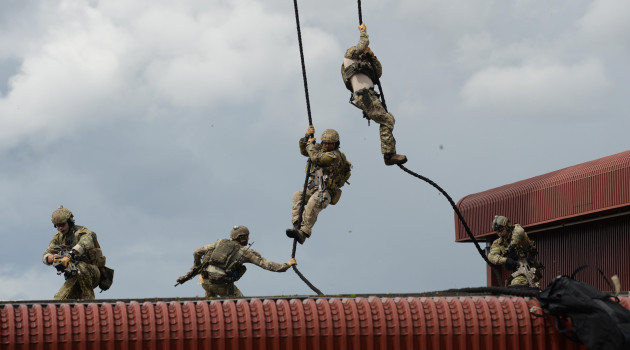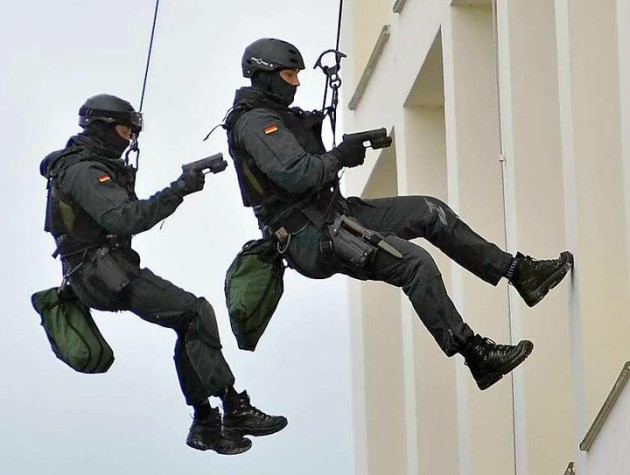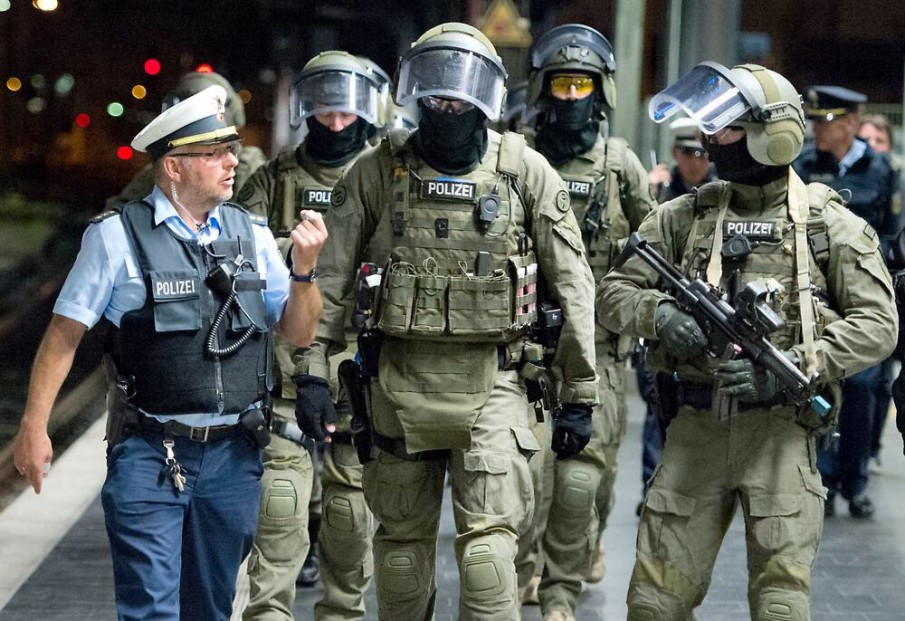The terrorist attacks in Paris, Copenhagen, and most recently in Tunis have compelled the German Federal Minister of the Interior, Thomas De Maizière, to promote the idea of a new counter terrorist unit as part of the federal police.
Simultaneous attacks across different locations often overwhelmed police officers and the German Police Union find that they are ill equipped to effectively challenge the ever-growing threat. Although the national police force employs plenty of officers, they lack the training and equipment, whilst the state SWAT teams and GSG-9 both have the tactical background, but exhibit a shortage of manpower to take on this responsibility by themselves.
German security officials recognize that Germany is not exempt from imminent plots by extremist groups and acknowledge the danger of such attacks. In recent years Germany has received and dealt with multiple threats by terrorist groups or individual supporters of violent extremists. However, they also admit that they have been lucky in the past when in two separate incidents, unidentified suitcase bombs failed to detonate at a train station in Bonn, as well as on a train in Nordrhein-Westfalen that would have resulted in the death of hundreds of people.
To effectively deal with simultaneous terrorist attacks in urban environments by heavily armed gunmen, the new federal police Counter-Terrorism unit would receive paramilitary training, armored vehicles, and state-of-the art equipment rivaling that of modern Special Forces units. From thermal optics, to body cameras, NVG’s, body armor, ballistic helmets, and heavy weaponry, the CT officers would closely resemble military SOF operators overseas rather than federal policemen – a bold statement which will most likely become a topic of discussion once the unit will be called into action and out of its shadows.
While the precise location of its new base is still unclear, it would undoubtedly be conveniently located in close proximity to an air wing section of the federal police. Emphasis would be placed on domestic surveillance and intelligence collection capabilities, as well as logistical support to project its assets to multiple locations simultaneously.

Germany’s world renowned GSG-9 could certainly deal with a single threat but they indisputably lack the manpower to sustain multiple ongoing incidents over an extended period of time (case in point: the Paris attacks). According to security officials, GSG-9 can only supply up to 100 operators at any given time. And even if local SEK units (Spezialeinsatzkommando – state SWAT) would assist with additional officers and resources, recent incidents have revealed a demand for a manhunt/search capability, which neither of the units possesses.
Pursuing heavily armed gunmen through densely populated areas not only requires a sizeable and equally equipped police force, but also calls for specific surveillance capabilities and a far-reaching intelligence network. According to the German Police Union, the federal police force requires a ruthless and brutal CT unit that can hit multiple targets hard and fast with military grade weaponry and tactics, backed by a far-reaching intelligence network and surveillance capability. They claim that recent incidents in Paris, Copenhagen or Tunis justify such a change and therefore demand a solution to avoid potential attacks on German soil. De Maizière’s new CT unit would bridge this gap between the GSG-9’s tactical capabilities and the evident lack of manpower, training and equipment to effectively deal with the current threat environment.
Despite recent improvements in Germany’s military and police budgets, De Maizière would like to allocate 328 million Euros to form the new CT unit and create 750 new jobs between 2016-2019. Out of those funds, 200 million would go towards new gear for CT operations ranging from the personal kit to advanced surveillance equipment and armored vehicles. The Minister of the Interior would like to see the first 100 officers of his new unit to be ready for duty by the end of 2015.
Surprisingly, there is no firm opposition from individual state police forces who employ their own SWAT units (SEK) and are typically first on the scene. While traditionally such units would jump at the chance to stock their budget for training and equipment, the German Police Union recognizes the nationwide threat posed by such terrorist groups and welcomes the formation of a new federal CT capability that can take on the responsibility to deal with such incidents.

Already have an account? Sign In
Two ways to continue to read this article.
Subscribe
$1.99
every 4 weeks
- Unlimited access to all articles
- Support independent journalism
- Ad-free reading experience
Subscribe Now
Recurring Monthly. Cancel Anytime.

However, De Maizière’s demand for a new CT unit received clear opposition from the democratic socialist party (Die Linke). They claim that there is no need for a budget increase and the formation of a new unit as that notion was simply based on a general feeling of uncertainty and fear among government officials and De Maizière’s political party (CDU – Christian Democratic Union, which incidentally also holds the majority in the Bundestag and is led by Chancellor Angela Merkel). In addition, they want the existing SEK, federal riot police and GSG-9 to handle such cases and be put to the test before spending more money on a new CT unit. Without delving too deep into politics here, it is clear that a failure to succeed such a proposed test could again result in casualties among civilians and law enforcement personnel.
Word among the German special police units boils down to the fact that nothing has officially been put in motion yet. While there is a clear support for the expansion of the domestic security apparatus, the new CT unit is still only based on a statement by the Minister of the Interior. As a result, the formation of a new CT unit is still up for debate, but the appreciation that has been directed towards the importance of a strong and well-equipped federal police force, capable of dealing with the ever-growing terrorist threat in large cities, is greatly valued by its police corps.












COMMENTS